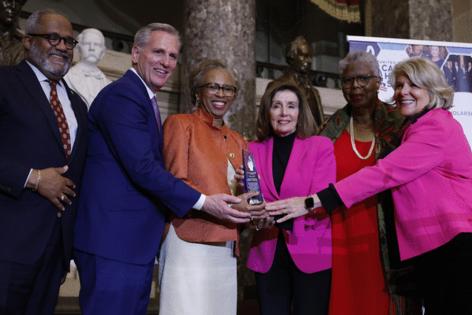At the Capitol, history is always in the making
Published in News & Features
WASHINGTON — When it came to contemplating her retirement, Jane Campbell looked to George Washington for guidance.
Before presidential term limits were codified, America’s first leader famously set a precedent by opting to serve only two. It’s a lesson that Campbell, outgoing CEO and president of the U.S. Capitol Historical Society, thinks more people should take to heart.
“I really do think that we ought to listen to what our founders said, what he did for this country when he said ... ‘We don’t have a king. We don’t have a monarch. We have a democracy,’” Campbell said last week as she prepares to pass the baton. “Getting the next generation in leadership is important.”
The Capitol Historical Society is a nonprofit, nonpartisan group that preserves and teaches the history of the Capitol. Campbell became its head in 2019 and shepherded the historical society through the coronavirus pandemic, the Jan. 6, 2021, attack on the Capitol and more.
Roswell Encina, formerly the chief communications officer at the Library of Congress, was approved by the historical society’s board of trustees last week and will take over the role on Nov. 5. Campbell will stay on to advise through the end of the month, she said, before moving on to spend more time with family and in Ohio, which still feels like home even after many years in Washington.
Before her time at the historical society, Campbell had a long career in politics, winning election in 1984 to the Ohio House. In 2002, she became Cleveland’s first female mayor.
Campbell, a Democrat, lost her reelection bid in 2005 but soon came to D.C., thanks in part to a connection she had made at a national conference of state legislators. She and Mary Landrieu, then serving in the Louisiana House, were some of the only elected women in attendance under the age of 40.
Landrieu went on to become a U.S. senator and brought on Campbell as her chief of staff in 2009.
The dynamics of a state legislature are not so different from Congress, Campbell said. Despite the intense focus on conflict, she looked for unexpected bonds — something she carried into her work at the historical society, whose events often bring the parties together around interest in Congress as an enduring institution.
When the society awarded its annual Freedom Award to Cheryl Johnson, for example, it was a chance to celebrate how the former clerk steadied the House through the events of Jan. 6, two impeachment proceedings and the drawn-out days of uncertainty in early 2023 that finally yielded Kevin McCarthy as speaker. Both he and Speaker Emerita Nancy Pelosi were on hand at the ceremony to mark the clerk’s place in history.
This year, the award went to another history-maker, former GOP Rep. Patrick T. McHenry, who acted as speaker pro tempore for 22 days after McCarthy’s ouster.
Under Campbell’s leadership, the historical society created “Capitol Civics,” an online repository of teaching resources, and worked to expand its virtual programming beyond its offerings inside the Beltway, which include tours, fellowships and live events. It also launched a “January 6 Oral History Project” to preserve memories from a day its website describes as “among the most significant — and tragic — in American history.”
Asked what she’s seen change over the years, Campbell said, “The biggest challenge in Congress now is that we are losing the middle. … We used to have a group of moderate Democrats that met on a regular basis, and most of those people have gone.”
That’s a challenge Encina will also have to confront as he takes the reins of a nonpartisan organization in a highly partisan time.
Encina is a former TV news reporter who transitioned to a role in communications for the Enoch Pratt Free Library in Baltimore, where he met its head, Carla Hayden. When Hayden was appointed librarian of Congress in 2016, she brought Encina over with her.
“For 18 years she’s been a trusted mentor, a dedicated boss. And now we’re friends,” Encina said of Hayden, who was removed by President Donald Trump in May. “When she was let go as librarian … it was hard to take it.”
The White House followed up days later by firing Shira Perlmutter, the register of copyrights, prompting an ongoing legal challenge and a request to the Supreme Court. Trump’s moves at the library were part of a broader campaign targeting cultural institutions, including the Smithsonian Institution, the National Archives and the Kennedy Center, all of which weighs on Encina.
“It’s hard to ignore it, with everything that’s happening, not just across Washington, but across the nation,” Encina said. “But we are a nonpartisan agency, and we have to really lean on that. We have to rely on members of Congress on both sides.”
Campbell sees hope in history and thinks the society has a role to play in reminding people of the country’s founding values, particularly with the semiquincentennial coming up in the summer. She acknowledges America is divided but is also quick to provide historical context.
“We had a civil war,” she said she reminds people who say things have never been this bad.
Four decades working in and around politics hasn’t shaken her faith in “the American experiment.”
“I continue to believe that the vast majority of the members of Congress got elected and chose to serve because they believe that they can do the best for their country and their constituents,” Campbell said. “The more we can bring people … to talk about those core values, the more we’re going to be able to move forward.”
_____
©2025 CQ-Roll Call, Inc., All Rights Reserved. Visit cqrollcall.com. Distributed by Tribune Content Agency, LLC.







Comments